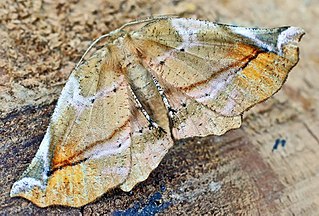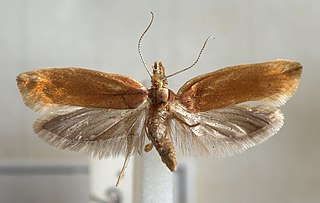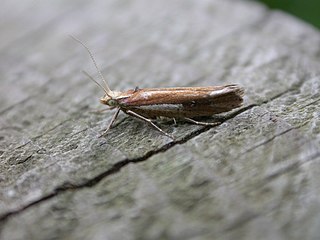
The common emerald is a moth of the family Geometridae. The species is found throughout the Nearctic and Palearctic regions and the Near East. It is mostly commonly found in the southern half of the Ireland and Britain. It was accidentally introduced into southern British Columbia in 1973.

Eupsilia transversa, the satellite, is a moth of the family Noctuidae. The species was first described by Johann Siegfried Hufnagel in 1766. It is distributed throughout the Palearctic.

Daphnis nerii, the oleander hawk-moth or army green moth, is a moth of the family Sphingidae. It was described by Carl Linnaeus in his 1758 10th edition of Systema Naturae.

Apeira syringaria, the lilac beauty, is a moth of the family Geometridae. It is found throughout Europe and east across the Palearctic to the Russian Far East and Japan.

Pandemis heparana, the dark fruit-tree tortrix or apple brown tortrix, is a moth of the family Tortricidae.

Ypsolopha scabrella, the wainscot hooktip or wainscot smudge, is a moth of the family Ypsolophidae. The species was first described by Carl Linnaeus in 1761. It is found in Europe, China, Russia, Asia Minor and mideast Asia.

Ypsolopha ustella, the variable ypsolopha moth, is a moth of the family Ypsolophidae. It is found in most of Europe and is also present in North America.

Ypsolopha parenthesella is a moth of the family Ypsolophidae. It is found from Europe to Japan, as well as north-eastern China, Asia Minor and mideast Asia.

Ypsolopha nemorella is a moth of the family Ypsolophidae. It is found in northern and central Europe, mid-eastern China and Russia.
Ypsolopha arizonella is a moth of the family Ypsolophidae. It is known from the United States, including Arizona.
Ypsolopha gerdanella is a moth of the family Ypsolophidae. It is known from the United States, including New Mexico.
Ypsolopha delicatella is a moth of the family Ypsolophidae. It is known from the United States, including Arizona and California.
Ypsolopha querciella is a moth of the family Ypsolophidae. It is known from the United States, including Arizona and Utah.
Ypsolopha maculatella is a moth of the family Ypsolophidae. It is known from the United States, including Arizona and California.
Ypsolopha vintrella is a moth of the family Ypsolophidae. It is known from the United States, including Arizona and California.

Ypsolopha vittella, the elm autumn moth, is a moth of the family Ypsolophidae. It is found from Europe through Siberia to Japan, including China, Asia Minor and mideast Asia. The habitat consists of woodlands and copses.

Ypsolopha is a genus of moths of the family Ypsolophidae. It is the type genus of the family and comprises over 120 described species.
Chionodes dentella is a moth in the family Gelechiidae. It is found in North America, where it has been recorded from Texas, New Mexico, Nevada, Arizona, California, Mississippi and Florida.















